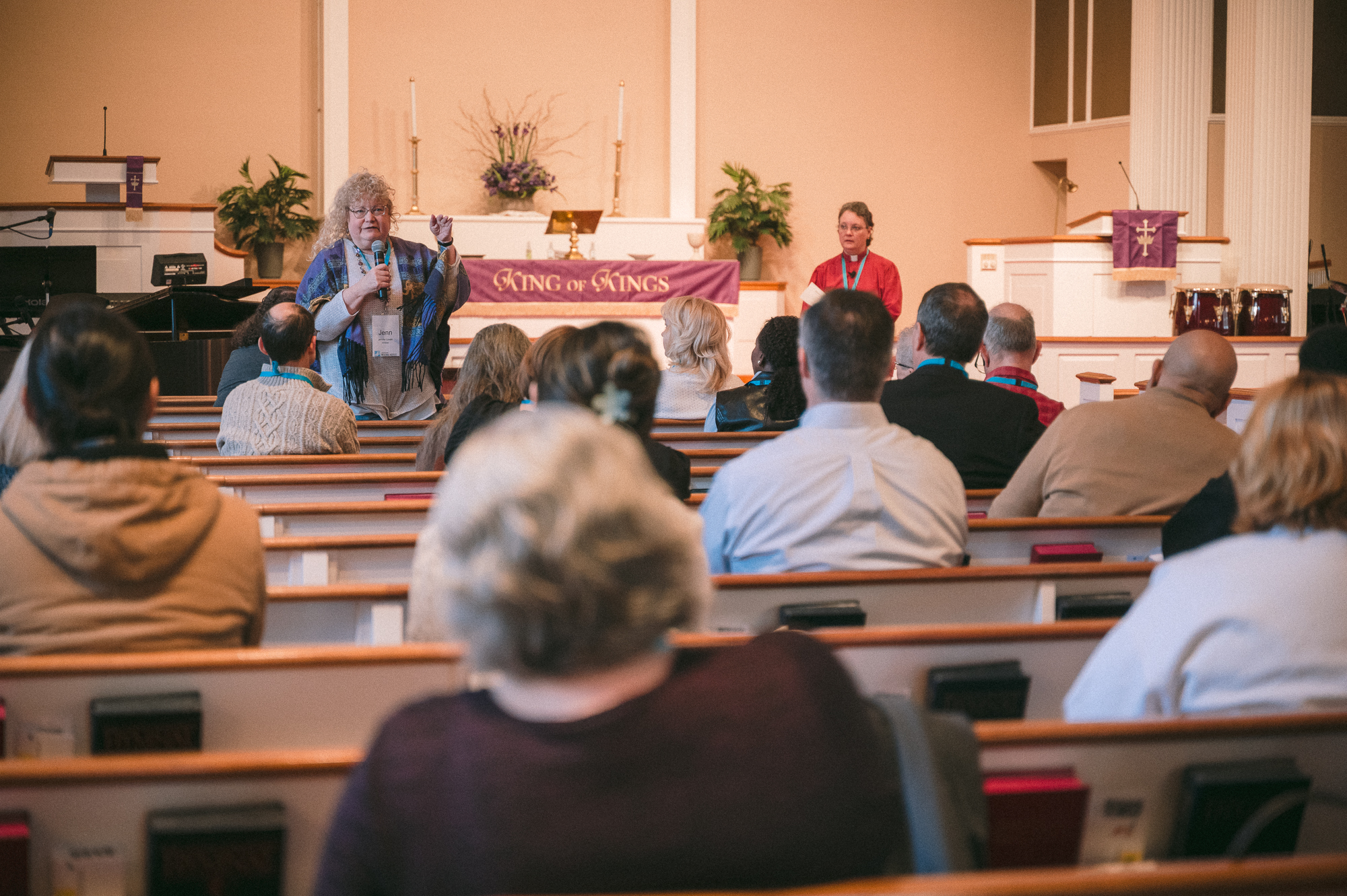
An inside look at the LAPI Preaching Summit
A sense of anticipation filled the air as the first cohort of 50 preaching fellows began to file in for the Leadership Academy Preaching Institute (LAPI). They gathered in Jarrettown UMC’s warm and inviting lobby space. Some grabbed a snack, while others stood in groups and chatted with friends, both old and new.
The weekend had been years in the making. “The cabinet and leadership discerned that if we could move forward on only one thing, the thing we needed to move the needle on is preaching,” shared the Rev. Dawn Taylor-Storm, Director of Connectional Ministries for EPA & GNJ.
Rev. Dr. Juel Nelson, Director of Leadership Development & Associate Superintendent for the Metro Highlands Region of GNJ, was grateful to watch the weekend come together. “The culture of learning that has been built enabled us to receive more applications than we had spots open. This opportunity was well-positioned to be effective and well-received.”
The fellows brought that passion for learning with them into the room. Sue Kiefner, CLM, serving Springfield UMC, shared, “I’m always looking to learn. Being so new at preaching, I want to learn more. I want to get better at sharing my message.”
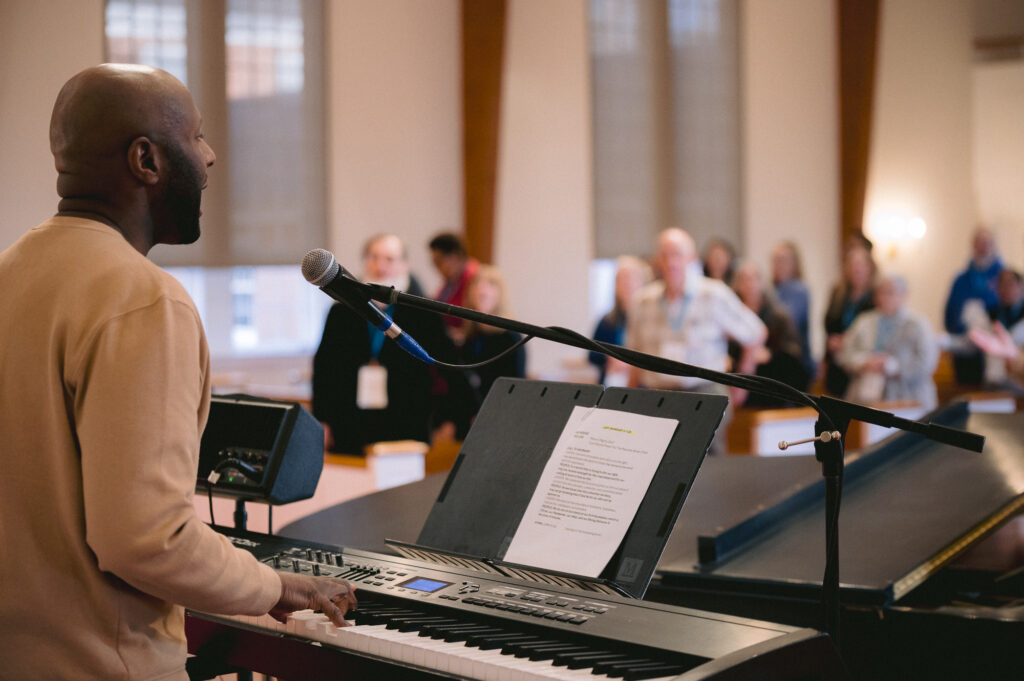
The summit began with a powerful worship service. Rev. William D. Carter III lifted both hearts and spirits as he played and led praise and worship for the opening convocation. Rev. Ronell Howard, District Superintendent for the Central District in GNJ, brought the message, selecting Psalm 91:1-2, 9-16 as her text and titling her sermon “Dial 91:1.”
She opened with a story about the time she accidentally started a small fire in her parsonage’s kitchen. The rising flames left her in a panic. She stood there frozen until a friend on the phone shouted, “Ronell, hang up, and dial 911.” She invited people to ponder the ways they might also get stuck, musing, “Don’t we do that in life? We sit immobile because we find ourselves with problems, and we don’t know what to do. Psalm 91:1 is our spiritual emergency number.”
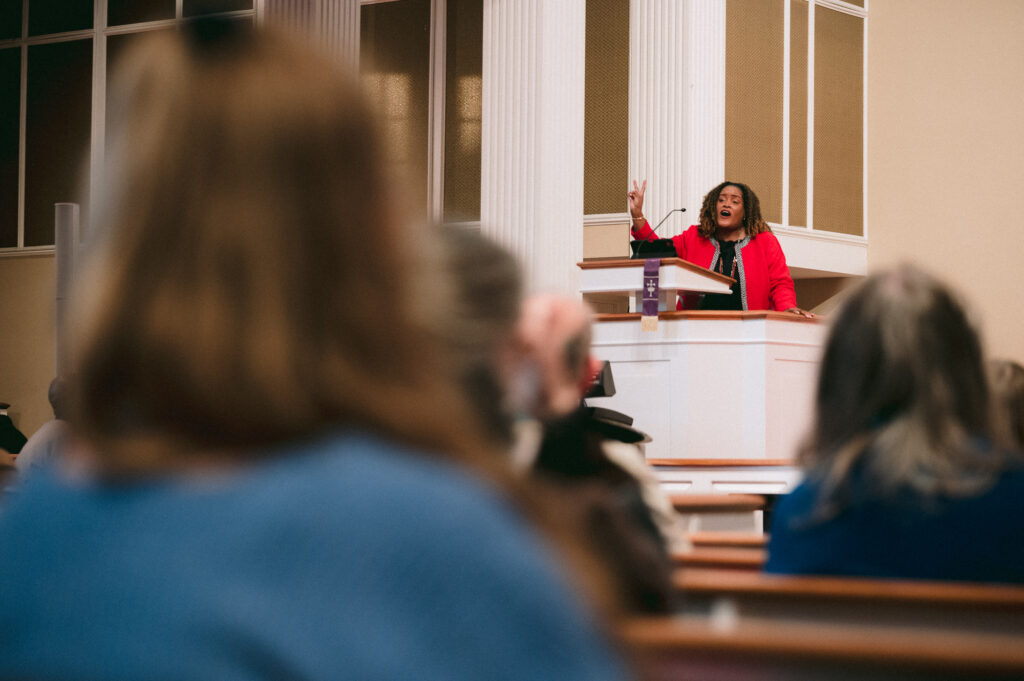
She named some of the challenges that might lead us to call 91:1: “The ‘20s opened with losing 1 million to COVID, disinformation, war in Ukraine and Gaza, mass deportation, budgets that rob food from needy families… I don’t know about you, but I want to experience precedented times.” After carefully identifying the challenges of our present situation, she turned our attention back to God’s steadfast love and grace, inviting us to consider how we have experienced for ourselves the gift of God’s protection and how we might respond to that grace. “God’s protection is promised,” she proclaimed. “When we embrace God’s promises, we embrace the responsibility to extend His presence to others.”
Her striking message hit home. While the preaching fellows left for dinner and their first gathering in their cohort groups, D.S. Howard sat down with conference videographer Corbin Payne to unpack how she crafted the sermon so that others might learn from her example.
Saturday morning’s session opened with a greeting from Bishop Moore-Koikoi. “The storehouse of God’s resources opened up so that this could happen. This is a miracle. I hope that you know that. I hope that you feel that. I’m grateful to all the clergy who said yes. All the clergy who said there’s a little more that I could learn so that even more people could be reached. I’m so grateful that you have said that God is not through with me yet.”
After Bishop Moore-Koikoi’s greeting, Rev. Dr. Leah Schade, the plenary speaker, stood to give her presentation. She reflected on the state of the church, which she had gleaned from a series of congregational surveys.
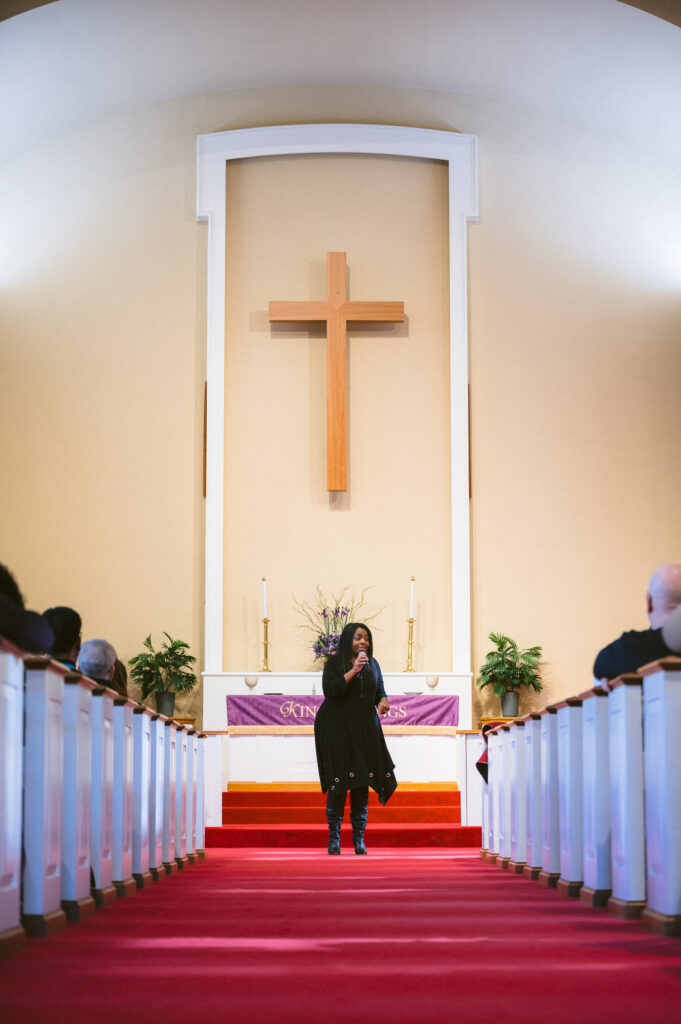
She shared that 80% of congregations are experiencing moderate to high stress, and clergy are stressed and experiencing burnout. When divisiveness and stress are high, it’s tempting to avoid preaching on social issues. However, what Dr. Schade discovered in her surveys was that 78% of people in the pews want their pastor to bring Biblical insight to pressing political issues. Cultivating effective sermon feedback groups is a way for the pastor to hear the heart of the majority.
After the morning session, cohorts departed to go and practice the skills they learned. They formed listener feedback groups of their own and provided sermon feedback to the brave pastor who offered to go first.
While cohorts offered sermon feedback, Rev. Dr. Darryl Stephens, Director of the Preaching Institute, paused to celebrate. Rev. Stephens shared, “This has exceeded my expectations. People are hungry for the opportunity for peer support, growth, and challenge. People need the tools—listener feedback groups—we heard this morning how divided we are. People want the tools to have the conversation in a constructive way.”
When they came back in the afternoon, the cohorts shared their experiences, and together fellows received tools that would help them level up their preaching.
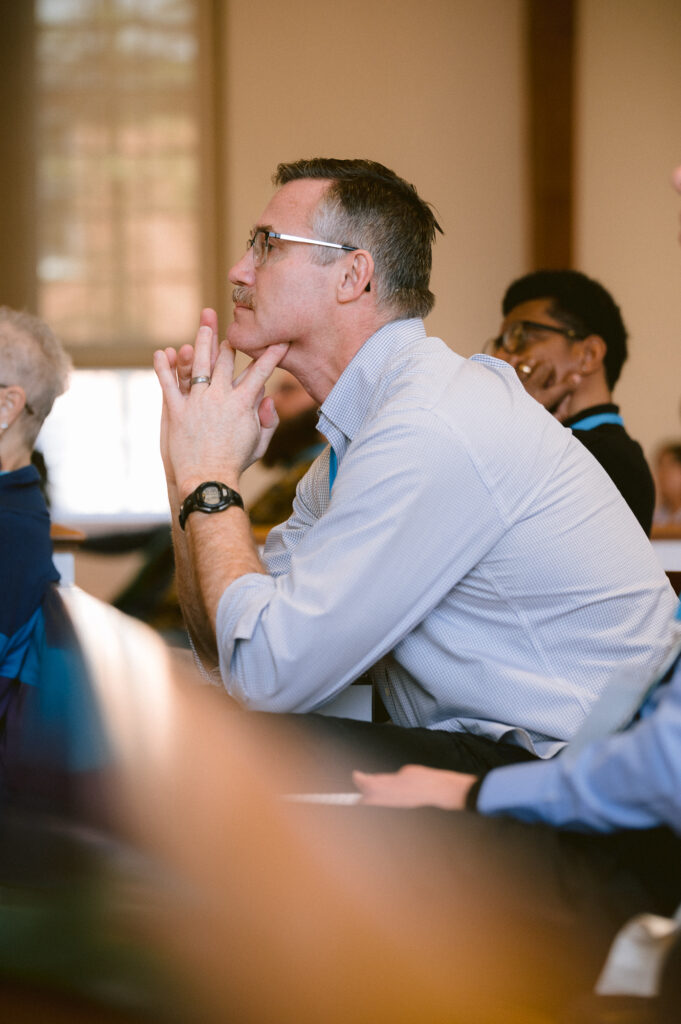
One preaching fellow shared that she was surprised by the amount of positive feedback she received. The critique she received from her cohort focused on the way she moved during her sermon. “Movement matters,” Dr. Schade reflected to the group. “Think about how your body is a highlighter and underliner for your oral presentation.”
Another fellow shared that her experience showed her that she’s not alone. “Most of our group is struggling with cross-cultural ministry. The process of our feedback was very helpful. The feedback we gave to our preacher, I am going to use for myself.”
Another fellow shared, “I found myself looking at many holes and gaps that I didn’t even realize I had. It’s very difficult to do self-examination. I am learning from my group.”
A fourth fellow shared that he found the feedback group exhilarating. “I found it exhilarating. I feel like I’m in a safe spot. I trust them. They want the best for me. All of the feedback was right on.”
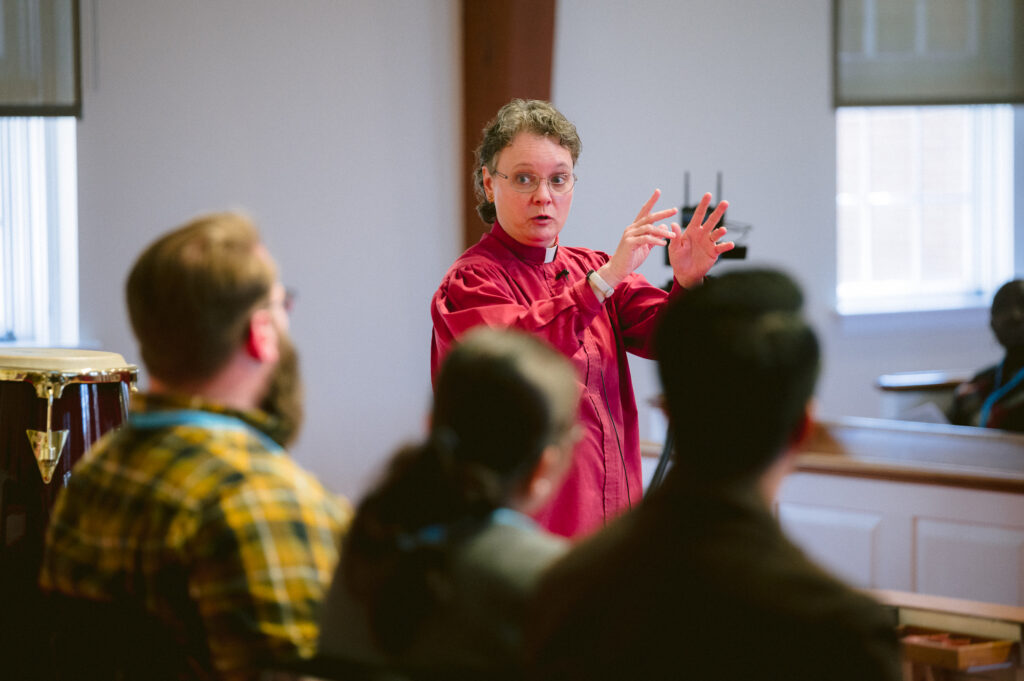
Another fellow honestly shared that their group found the format of the questions challenging and suggested rearranging the questions for better flow. Dr. Schade acknowledged that we are still learning how best to give and receive feedback on sermons. The process requires experimentation and practice. The Leadership Academy Preaching Institute is on the leading edge of developing this practice.
The summit ended the same way it began—with worship. Dr. Schade literally practiced what she preached as she offered the closing sermon. Preaching fellows were able to witness her embodying the same best practices she taught throughout the day as she unpacked the scripture.
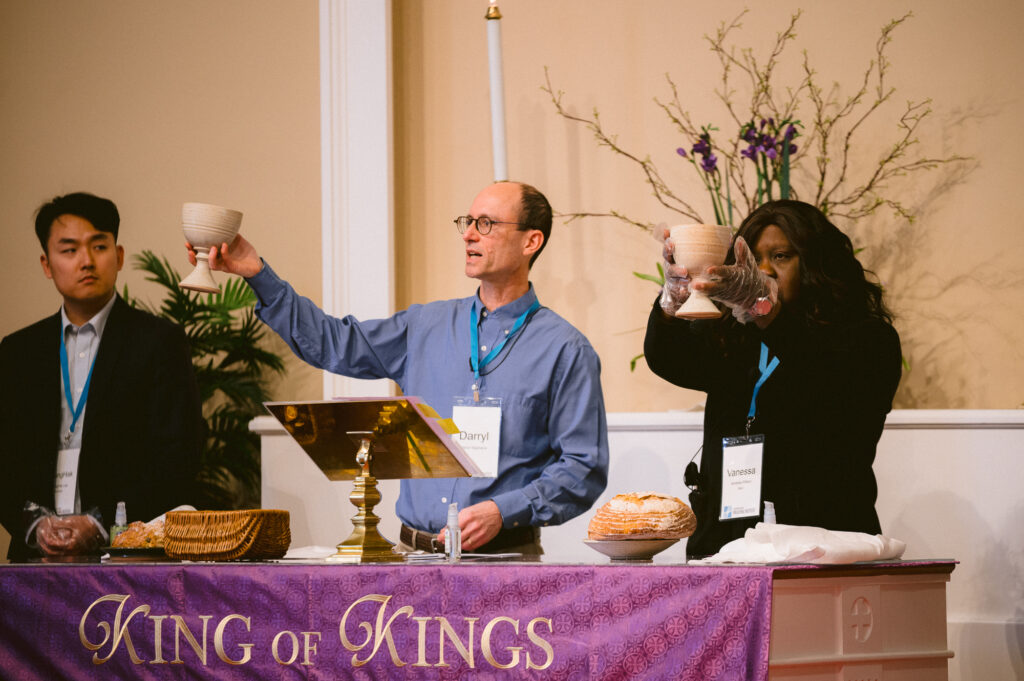
After a moving closing communion service, the fellows departed for all the places to which God has sent them, equipped with new insights and a few new tools to help them bring the word of God alive in their context, which is no easy feat.
In her greeting to the fellows, Bishop Moore-Koikoi stated, “The art of preaching is changing. It is shifting in our culture. The techniques we used to know that could reach people’s hearts and motivate them—those techniques don’t work anymore. We’ve got to learn a new way of oratory. A new way of helping to deliver the message.”
The landscape of preaching is ever-changing. We all need new ways to help deliver the message of God’s grace. If you feel called to stretch and grow alongside your colleagues in ministry, the next round of Leadership Academy Preaching Institute applications opens May 1.
Check out a video recap of the 2025 Preaching Summit. Apply today to be a 2026 Preaching Fellow. Application deadline is August 31.
